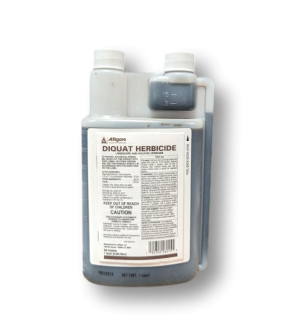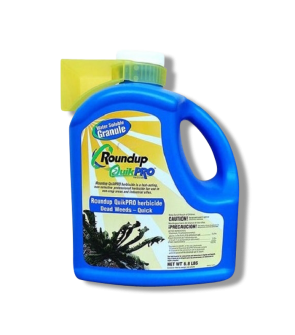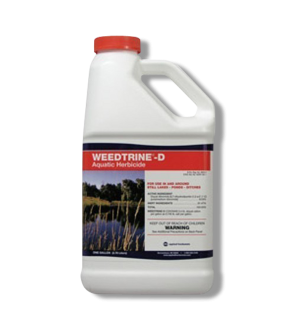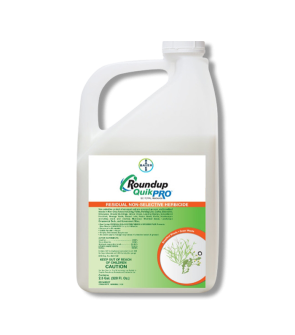Gain access to personalized product screening, the best pricing, rewards, and more!
Most Effective Products
Diquat
Diquat is a fast-acting aquatic and landscape herbicide that kills weeds and grasses. It is frequently used in the agricultural industry for pond management and has several outdoor residential weed control applications.
Solutions Pest & Lawn has several products in our herbicide inventory that contain Diquat, and we highly recommend this active ingredient to our customers who own ponds or manage bodies of water. On this page, you can learn some interesting facts about diquat, its mode of action, and its benefits. You can also access this page to shop our recommended products that contain Diquat.
What is Diquat?
Diquat is a non-volatile herbicidal active ingredient used as a general herbicide to control weeds in commercial greenhouses and nurseries, ornamental seed crops, landscape, industrial, recreational, commercial, residential, and public areas; turf renovation (all turf areas except commercial sod farms); dormant established turfgrass (such as bermudagrass and zoysiagrass); and aquatic areas.
Diquat's original form is a colorless yellow crystal that is red when mixed as a solution. It is odorless. It is highly soluble in water and has a high affinity for soil. Formulations meant for aquatic weed management are usually liquid.
How Does Diquat Work?
Mode of Action
Diquat mode of action involves disrupting cell membranes and interfering with photosynthesis. It is a non-selective herbicide and will kill various plants on contact. Diquat is a desiccant because it causes a leaf or an entire plant to dry quickly.
It is used to desiccate potato vines and seed crops for agricultural farmers, to control the flowering of sugarcane plants, and to control industrial and aquatic weeds.
Benefits of Diquat
Diquat acts quickly and kills on contact, causing injury only to the parts of the plant to which it is applied.
Diquat is best used to control aquatic weeds that interfere with recreation and aesthetics in ponds, lakes, and other managed water bodies. It is non-selective, so you should also use it when you don't mind all plants dying.
Drawbacks of Diquat
Diquat is not systemic, meaning it does not move throughout the target plant; it will only kill parts of the plants that it contacts. It is not residual, so it does not leave any trace of herbicide on or in plants, soil, or water, which helps it continue killing other emerging plants.
Do not use Diquat in large amounts on a water body, especially if there are fish and other aquatic life in the water.
Is Diquat Safe?
Diquat is safe to use when applied according to the label directions. Diquat dibromide binds strongly with soil and has low mobility in the environment. To minimize toxicity to fish and aquatic life, follow the label and treat ponds in sections rather than all at once.
Wear personal protective equipment (e.g., gloves, long-sleeved clothing, protective eyewear, and a safety mask) before mixing or handling Diquat products.
What To Expect

Following Diquat treatment, the product works immediately upon contact with the target weeds. Plants will die within a week. When applied to water bodies, it is best to treat them in sections rather than all at once. Wait 10 to 14 days before making sectional treatments.
Featured Products
Diquat Dibromide Aquatic Herbicide—Diquat is an industrial weed killer for controlling pond weeds, pond algae, and other aquatic weeds. We carry Alligare Diquat, a generic version of Reward Herbicide that is much more cost-effective. Diquat is a weed-killer concentrate that needs to be mixed with water before application. You will not find a safer aquatic herbicide for killing pond weeds and algae.
Weedtrine D Aquatic Herbicide—Weedtrine D Aquatic Herbicide is a broad-spectrum liquid aquatic herbicide for use in and around still lakes, ponds, lagoons, ditches, non-crop, or non-planted areas. It controls a wide range of filamentous algae and submerged and floating aquatic weeds.
-
Q:I want to use Duquat in 3' deep water, can I mix it 50/50 with water and use a compressed lawn sprayer with the nozzle under water? The weeds are mainly submersed. Or is there a better way?5/23/24A:You will want to apply 0.5-2.0 gallons Diquat in water per surface acre (per 4-foot water depth) in an invert emulsion carrier with weighted hoses that injects the diluted spray solution near the bottom.
Colin Travis
6/7/24










